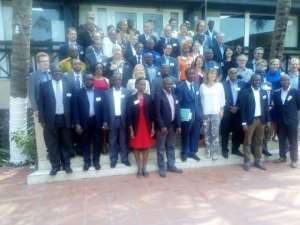
Professor William Baa-Boateng, Senior Lecturer, Department of Economics, University of Ghana, has called for effective collaboration between Universities and industry to curb graduate unemployment.
Prof Baa-Boateng said it was important for employers to make known to the Universities the kind of expertise they wanted from training institutions to enable them develop a curriculum to meet the needs of the industry.
Prof Baa-Boateng made the call on Tuesday in Accra at a stakeholder workshop on the theme: 'Improving Graduate Employability through Capacity Building Partnerships.'
The forum brought together representatives from tertiary institutions in the country and Africa to chart the way forward in addressing graduate unemployment on the continent.
The workshop was organised by the German Academic Exchange Service (DAAD), a German support organisation of international academic co-operation, in collaboration with the National Council for Tertiary Education.
According to the Professor, the current state of youth joblessness particularly among the educated youth has brought to the fore the relevance of university education to the world of work.
He stated that with the rapid evolution of the '4th industrial revolution', the challenge could be exacerbated; adding that, the current education and skills training system must be reviewed in line with the technologically changing world of work.
Professor Baa-Boateng said the high rate of graduate unemployment was due to poor quality of growth driven by exploitation of natural resources and the dwindling agriculture and de-industrialization in Africa.
He said statistics from the labour force revealed that graduate unemployment rate between the ages from 15-25 was 15.4 per cent, while that of vocational and technical was 22.8 per cent.
He mentioned 'skills mismatch' in graduate education and training as another factor contributing to graduate unemployment in the Africa, due to the relevance of program of study and the content and teaching methodology developed by the Universities.
Prof Baa-Boateng said there was limited training in Science, Technology, Engineering, and Mathematics relative to humanities.
He said statistics showed that in 2015, there were more than 70 per cent of students studying business and social sciences related programmes with limited 15 per cent of students offering science.
Prof Baa-Boateng explained that there was limited collaboration between training institutions and employers in the area of curricula development, research and industrial attachment.
He said there was problem with method of delivery in the Universities, where there was absence of case study in teaching, placing strong emphasis on examination and certificate instead of practical.
The professor was of the view that University programmes must require training of the mind to make trainees adaptable in the fast changing labour market.
He stated that labour market engagement should take the form of adoption of case studies in teaching, ensure occasional involvement of practitioners in training and regular review of curricula in line with changing job market.
Dr Anette Pieper, Director of Projects, DAAD said the workshop was to provide a platform to showcase the achievement of projects and initiative sin Sub-Saharan Africa, create an opportunity for the establishment of international networks and act as a source of inspiration for synergies and future joint activities.
GNA
By Kodjo Adams, GNA




 Chairman Kingsley Owusu Brobbey calls for Privatization of Electricity
Chairman Kingsley Owusu Brobbey calls for Privatization of Electricity
 Train accident: Four more grabbed and remanded
Train accident: Four more grabbed and remanded
 Gov't to consolidate cash waterfall revenue collection accounts
Gov't to consolidate cash waterfall revenue collection accounts
 Gov't to settle lump sum for retired teachers by April 27
Gov't to settle lump sum for retired teachers by April 27
 Former PPA CEO granted GH₵4million bail
Former PPA CEO granted GH₵4million bail
 Dumsor: The darkness has exposed you; you’ll go down as the worst in Ghana’s his...
Dumsor: The darkness has exposed you; you’ll go down as the worst in Ghana’s his...
 Dumsor: The ‘incompetent’ person provided a timetable whiles those who came to s...
Dumsor: The ‘incompetent’ person provided a timetable whiles those who came to s...
 Defend, ensure NPP’s good works are ‘sold’ and highlight the ‘bad’ state of the ...
Defend, ensure NPP’s good works are ‘sold’ and highlight the ‘bad’ state of the ...
 Bawumia will rank high ahead of Mahama in any anti-corruption test — Salam Musta...
Bawumia will rank high ahead of Mahama in any anti-corruption test — Salam Musta...
 NPP trying to bribe us but we‘ll not trade our integrity on the altar of corrupt...
NPP trying to bribe us but we‘ll not trade our integrity on the altar of corrupt...
